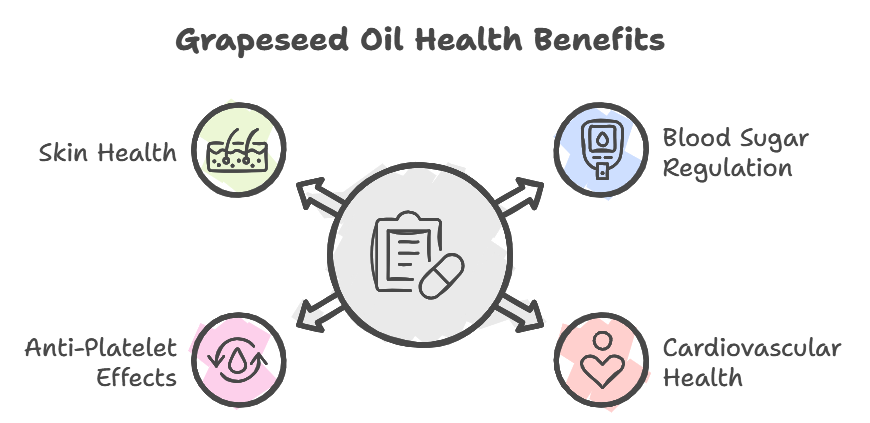Grapeseed oil has become a popular cooking oil, prized for its neutral flavor and high smoking point. But is grape seed oil good for you? This guide explores the origins, nutritional profile, potential benefits, and drawbacks of grapeseed oil.
From Vineyard Waste to Versatile Oil: The Story of Grapeseed Oil
Grapeseed oil originates from grape seeds, once discarded as winemaking byproducts. This transformation minimizes waste and creates a versatile oil.
Extraction often involves chemical solvents like hexane. Most of these solvents are removed, but trace amounts may remain1. Research continues to explore eco-friendly alternatives like cold pressed grapeseed oil.
Nutritional Breakdown: Decoding Grapeseed Oil
Grapeseed oil’s nutritional profile is interesting. It isn’t packed with vitamins and minerals, but it’s a good source of vitamin E. Grapeseed oil is mostly comprised of polyunsaturated fats, primarily omega-6 fatty acids.
Omega-6 fatty acids are essential for heart health and overall well-being, but it’s important to maintain a balance with omega-3 fatty acids for optimal health.
For a deeper understanding of the health benefits of grapeseed oil and its role in supporting mental health through its fatty acid profile, you might find it helpful to read about the benefits of natural oils for anxiety relief here.
This article explores various oils, including grapeseed oil, and their potential effects on anxiety and overall health.
Fatty Acid Profile: A Balancing Act
Grapeseed oil consists mainly of polyunsaturated fats (70%). It also contains monounsaturated fats (16%) and saturated fats (10%). The main polyunsaturated fat is linoleic acid, an omega-6 fatty acid.
One tablespoon provides vitamin E (3.9 mg), 26% of the recommended daily intake2. While research explores the effects of excess omega-6 fats, grapeseed oil’s composition warrants further study.
A study found linoleic acid doesn’t increase inflammation like other omega-6s.
Vitamin E Powerhouse: Antioxidant and Immune Support
Grapeseed oil is rich in vitamin E. This potent antioxidant protects cells from free radicals. Vitamin E supports immune function and may have a role in cancer prevention.
This protection is vital for overall health, as oxidative damage is linked to various chronic conditions, including heart disease and cancer prevention3.
Vitamin E is not only essential for cellular health but also supports immune function. It helps enhance the body’s immune response, which is particularly important during times of illness or stress.
Some studies even suggest that vitamin E may have a potential role in cancer prevention by promoting healthy cell function and reducing inflammation
In addition to its immune-supportive benefits, grapeseed body oil’s vitamin E content may contribute to skin health.
Grapeseed oil skin can help maintain skin elasticity and hydration while protecting against UV damage and premature aging. The antioxidant properties of vitamin E can also aid in healing skin and reducing the appearance of scars
Potential Health Benefits: Exploring the Evidence
Research on grapeseed oil suggests several potential health benefits. It may help manage blood sugar and reduce inflammation.
Blood Sugar Regulation: A Promising Ally
Organic grapeseed oil, derived from Vitis vinifera (grape seeds), shows promise for blood sugar regulation, particularly for individuals with insulin resistance. A study highlighted that grapeseed oil improved insulin sensitivity more effectively than sunflower oil.
In addition, it reduced levels of CRP (C-reactive protein), a marker for inflammation linked to metabolic and cardiovascular issues. Beyond its internal benefits, grapeseed oil is also valued in hair care routines, especially for those with fine hair, as its lightweight texture nourishes without weighing strands down.
Rich in antioxidants, it supports scalp health and works well alongside sweet almond oil to enhance hydration and strengthen hair.
Grapeseed oil is high in polyunsaturated fats, particularly omega-6 fatty acids, and low in saturated fats, making it suitable for low-saturated-fat diets, which can support healthy blood lipid profiles and anti-inflammatory effects.
These qualities make it an option worth considering for those looking to manage blood sugar levels and inflammation naturally, though balance with other fats is recommended to prevent excess omega-6 intake, which can sometimes lead to inflammatory responses.
That’s why it’s important to be mindful of the types of fats you include in your diet. Finding the right balance can make a big difference in how you feel day to day.
I recently came across something that might help—NOW® Foods Solutions offers natural, high-quality options to support balanced nutrition. If you’re looking for a way to manage blood sugar and inflammation without overloading on omega-6s, NOW organic grape seed could be worth checking out.
“Healthy cooking oils are essential for a balanced diet. Grapeseed oil is a fantastic option due to its high smoke point and nutritional benefits.”
Dr. Mark Hyman
Cardiovascular Health: Heart-Healthy Potential
The American Heart Association 4 suggests polyunsaturated fats, like those in grape oil, can support heart health. They recommend replacing trans and saturated fats with polyunsaturated fats.
More research on grapeseed oil specifically is needed. Consuming healthy fats, such as grapeseed oil, along with a balanced diet is key to a healthy lifestyle.
Anti-Platelet Effects: Maintaining Healthy Circulation
Organic grapeseed oil, extracted from grapes during the winemaking process, may support healthy blood circulation. Its anti-platelet properties could help regulate blood clotting, reducing the risk of excessive clotting and promoting heart health.
Beyond cardiovascular benefits, grapeseed oil is also valued in hair care regimens. Rich in antioxidants, it helps combat free radicals, which can damage hair and scalp health.
This contributes to healthy hair growth and overall strand resilience. The natural goodness of organic grape seed makes it a popular addition to hair care products, aligning with a healthy lifestyle that prioritizes both inner and outer well-being.
Also, grape oil is non-comedogenic. It won’t clog pores. This helps those with oily or acne-prone skin.
Grapeseed oil skin helps circulation and skin health. So, it’s a good choice for nutrition and skincare.

Beauty Benefits of Organic Grapeseed Oil: Skin and Hair Care
Grapeseed oil, rich in emollients, antioxidants, and Vitamin E, is known for its potential cosmetic benefits. Further research is needed to validate anecdotal claims (NCBI). High linoleic acid concentrations suggest it warrants further investigation. Until then, personal experiences show improvements in skin and hair with regular use.
Skin Deep: Potential Advantages and Considerations
Grapeseed oil absorbs quickly without leaving a greasy residue. This makes it suitable for sensitive and oily skin. Its antioxidant content may help combat inflammation from free radicals.
Also, grape oil’s linoleic acid strengthens the skin barrier. It improves hydration and resilience.
However, these properties are beneficial. But, skin reactions can vary. Always test a small area of skin before regular use, especially on sensitive skin.
Hair Health: Potential Benefits for Hair
Grapeseed oil benefits extend beyond skincare, showing promise in hair care as well. While it is less studied than coconut or olive oil, some stories and early research suggest it may strengthen and repair hair.
As a hair oil, it works well as a carrier oil, blending seamlessly with other natural oils like castor oil to enhance its effectiveness as a pre-shampoo treatment. This lightweight oil nourishes without greasiness, making it a great choice for maintaining healthy, hydrated hair.
This ingredient is high in linoleic acid, an essential fatty acid that helps boost moisture and elasticity in hair, reducing dryness, breakage, and frizz. Its anti-inflammatory properties support a healthy scalp, making it beneficial even for those with an oily scalp.
Additionally, grapeseed oil contains high levels of nutrients that contribute to overall health, and its heart-friendly composition, including traces of ricinoleic acid, has been linked to benefits beyond hair care, such as reducing the risk of heart disease.
Many studies focus on oils, like coconut and essential oils, for their strengthening effects. Grape oil shows promise due to its lightweight nature and nutrients. It may be a good option for daily hair care.
Also, research on essential oils, like rosemary oil, shows they can improve hair growth and health. This supports the idea that some plant-based oils may have reparative benefits5
For more scientific context on grapeseed oil and its potential effects, you can read this study. More research is needed to better understand grapeseed oil’s specific effects on hair health.
Culinary Uses of Grapeseed Oil
Grapeseed cooking oil is versatile. It works well for medium-heat cooking. So, it’s a great choice in the kitchen. Grape oil has a high smoke point (around 420°F/215°C). It’s great for sautéing, frying, and baking. It won’t break down or impart a strong flavor.
Its neutral taste is perfect for subtle recipes, like dressings, sauces, and marinades. It lets other flavors shine.
For high-heat cooking, use oils high in saturated and monounsaturated fats. Good options are avocado or coconut oil. They are stable at high temperatures.
Grapeseed cooking oil is versatile. But, it is debated against canola oil. It has a similar smoke point but contains less omega-6. Some experts consider it healthier due to its better fatty acid profile.
As with any cooking oil, moderate usage is best to maintain balance in dietary fat types.
Potential Risks of Grapeseed Oil
Despite potential benefits, there are risks to consider. One study on vegetable oils found that some are made with chemical solvents. These solvents may be harmful if inhaled. More research is needed on the long-term effects of these production methods. Look for cold-pressed or expeller-pressed grapeseed oil to avoid chemically produced options.
Some studies found trace amounts of polycyclic aromatic hydrocarbons (PAHs) in some vegetable oils, including grapeseed oil. More research is needed to understand any potential long-term health effects.
Frequently Asked Questions
Is grapeseed oil good for you?
Grape oil can be part of a healthy diet. It offers vitamin E and polyunsaturated fatty acids. Like all oils, it’s high in calories and should be used in moderation. Choose expeller-pressed grapeseed oil over chemically processed versions.
Is grapeseed oil better for you than olive oil?
Both oils offer benefits. Grapeseed oil has more vitamin E. Olive oil provides monounsaturated fats, vitamins, minerals, and antioxidants. Grape oil is often favored for its neutral flavor.
Consider your individual needs and preferences. Olive oil is generally better for high-heat cooking. Grapeseed oil is a great choice for lower temperature cooking and in dressings and marinades.
Is grapeseed oil good for frying?
Grape oil has a moderately high smoke point. However, its polyunsaturated fats can oxidize at high temperatures.
Healthier frying oils are high in monounsaturated or saturated fats. Use oils like olive, coconut, or nut oils. Use grapeseed cooking oil for dressings or baking.
Is grapeseed oil better than avocado oil?
Both grapeseed and avocado oils are healthy choices. They have similar nutritional profiles (USDA). Both have neutral flavors and high smoke points.
Choose non-hydrogenated options. Trans fats have proven negative health impacts. Ultimately, the “better” oil depends on individual needs.
Conclusion
Grapeseed oil, a byproduct of winemaking, has become a versatile culinary and cosmetic oil. It offers potential benefits like antioxidant protection and blood sugar regulation. Consider the potential risks associated with high-heat cooking.
Ongoing research continues to explore its full effects. Understanding grape oil’s nuances helps you incorporate it into a healthy lifestyle. Consider both its advantages and potential drawbacks.
Try substituting grapeseed oil for your usual cooking oil this week and notice the difference in flavor and health benefits. Share your experience with friends and family!
Small Step, Big Impact
Consider substituting your regular cooking oil with grapeseed oil in your next meal to experience its neutral flavor and potential health benefits firsthand.
Listen to this article
This is an AI generated Podcast version of the article.
- https://www.mdpi.com/2227-9717/9/10/1839/htm[↩]
- https://fdc.nal.usda.gov/fdc-app.html#/food-details/171028/nutrients[↩]
- https://www.medicalnewstoday.com/articles/318395[↩]
- https://www.heart.org/en/healthy-living/healthy-eating/eat-smart/fats/polyunsaturated-fats[↩]
- https://www.verywellhealth.com/what-is-grapeseed-oil-5085382[↩]



